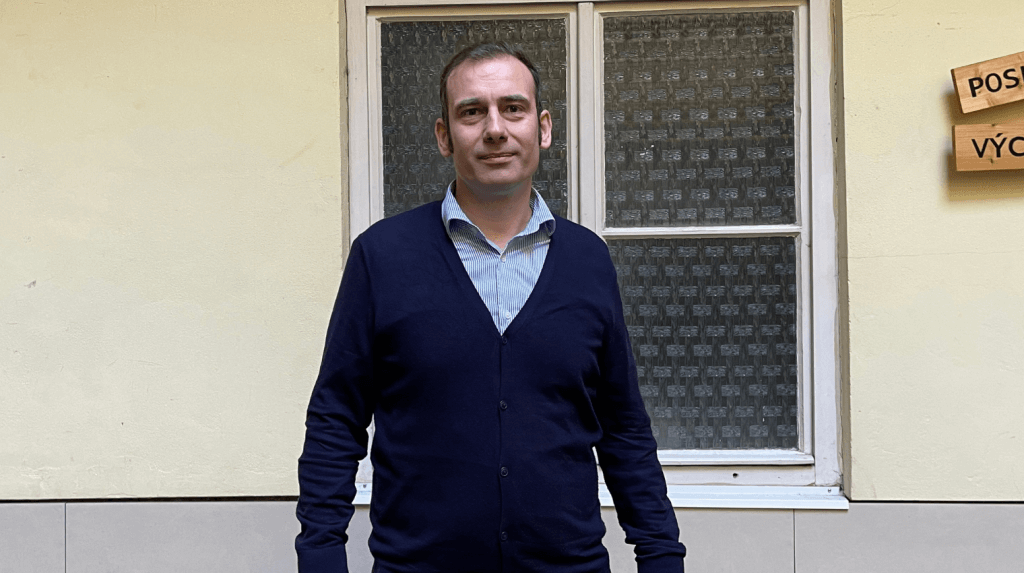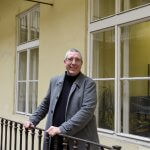Dino Numerato: I get inspired by my PhD students, consulting with them is refreshing

Why did he choose sociology as his field of study? What research topics is he currently working on? And what does he appreciate about his students?
Read our interview with Dino Numerato, a researcher at the Institute of Sociological Studies FSV UK. The interview was recorded as part of the De Facto podcast. This episode is hosted by Alice Němcová Tejkalová.

Alice Němcová Tejkalová (ANT): Why did you choose sociology as your field of study?
Dino Numerato (DN): The intention to study sociology was not entirely in the background of my interest as a student. Originally, I wanted to study journalism, I wanted to be a sports journalist. That was my plan when I finished high school. I applied to several universities, including Masaryk University in Brno, where journalism was studied together with other disciplines. And when I looked at their list, I also saw sociology. I found out that part of the admissions procedure would be devoted to mathematical, logical thinking. And that’s where I sensed an opportunity. I suspected that journalism was more likely to attract students who were interested in humanities study programs.
So I added sociology to journalism and started studying it without knowing anything about it at the time. So here I’m perhaps busting the myth of a linear academic career with very precise ideas about what you’re going to do. Then I also had the opportunity to spend some time in the media, so in sociological language I can say that I was able to make participant observations, to experience what the media world is like. At the same time, I was fortunate to be able to take a number of great courses that were related to sociology or media studies. At that point, I realized that I was going to study and think about media rather than be a journalist covering sports as I had originally planned.
ANT: You’ve remained loyal to sports, though. You were involved in sports fandom, for example. What made you change that focus and move more towards healthcare topics? I know you are still involved in sports, but less than you used to be.
DN: The journey was quite long and tortuous. As part of my PhD studies, I studied media sociology at the Faculty of Social Studies at Masaryk University in Brno. And then, to put it very banally, to further break the myth of a linear scientific career, I wanted to find a job in Italy. At that moment, the Bocconi University was looking for someone to be part of a team that would conduct an ethnographic study of sports associations, among others, in the Czech Republic. But after it was over, I had no other opportunity to continue my sociology of sport. So, also in order to stay in Italy for various reasons, I ended up accepting the offer to work on a project that was not sociological, but related to the field of epidemiology and health economics, which involved statistical skills. And so this is where my interest in health was born.
While I was working with epidemiological data, I was still finishing up a number of texts and publications that I had distributed from the field of sociology of sport, within which I had built up a certain reputation, and found that I couldn’t completely escape from it. So at some point I built a project that was about football fans. I was interested in the impact of critical initiatives by football fans on the football world.
My sociological thinking always followed the same theoretical line, which was the impact of critical thinking or civic initiatives on different social spheres. In the case of my PhD, it was the impact of critical thinking on the media itself; in the case of my postdoc that I mentioned, it was the impact of critical thinking about commercialized and globalized sport on sport itself. And this theoretical line of inquiry also interested me in the case of health and illness. I was looking for a way to capitalize on the epidemiological experience I gained through the project in a different social sphere. If I put it chronologically and very briefly, the three social spheres that were the subject of my interest were the media, sport, health and healthcare.
ANT: And what are today’s ISS students like? How do you find working with them?
DN: We work very well together. I meet with students at different levels. On the one hand, I teach a large undergraduate course that is very lecture-based, so there is unfortunately not much room for interaction and discussion. But at the same time, on the other hand, the moment students are curious, they turn to me. We develop their interest during consultations, which is probably the most important and interesting part of teaching for me. And I think this is confirmed at the doctoral level.
I haven’t completely got rid of administrative duties and it is true that sometimes my attention is very fragmented because of that. Sometimes I have difficulty concentrating on developing topics that certainly deserve to be well developed. But let’s say that I try to compensate for the lack of creative peace by being inspired by my PhD students who still have it. Consulting with them is hugely refreshing and inspiring for me, because I can see that their thinking is not completely overwhelmed by the project routine that sometimes forces us, whether we want to or not, to publish texts that we know we can routinely handle, but rob me of time for larger projects that I, nevertheless, believe I will finish one day.


